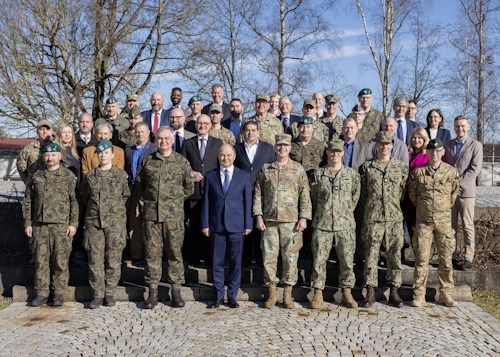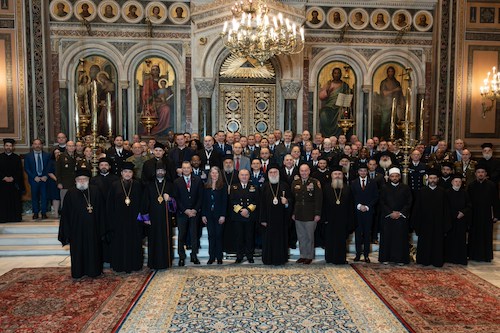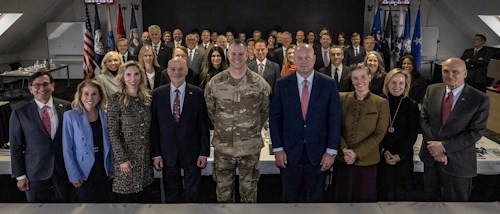Since the onset of COVID-19 the flow of information from the Pentagon has come in a steady stream, with Secretary of Defense Mark Esper reiterating in his updates that the Department of Defense is fully committed to the interagency, whole-of-government response to combat the pandemic.
For U.S. European Command (USEUCOM), that charge is with the command’s interagency partnering directorate, or J9. Led by civilian senior executive Wayne Raabe, the J9 is where collaboration among agencies is an everyday occurrence.
During the COVID-19 outbreak, the J9 and other USEUCOM directorates have worked closely with Allies and partners across the theater to prevent the further spread of the virus. Early in the pandemic, the J9 team facilitated the transfer of $150,000 worth of excess medical equipment and related supplies to Italy. The Overseas Humanitarian, Disaster Assistance, and Civic Action (OHDACA) team is currently working with other staff directorates to deliver the $10 million of assistance to Italy promised by the President. They are also enabling local procurement of over $450,000 in humanitarian donations of personal protective equipment and supplies for civilian medical personnel and first responders in the Balkans, Caucuses, and Baltic regions.
“Our support to our Allies and partners in this time of crisis is resolute,” said Raabe. “We will overcome this challenge together, and we are doing everything we can to help.”
Raabe’s directorate includes experts from multiple agencies including Department of State (DOS), Department of Justice (DOJ), U.S. Agency for International Development (USAID), Federal Bureau of Investigation (FBI), Office of Overseas Prosecutorial Development, Assistance and Training (OPDAT), and civil affairs teams–to name a few. They bring the skills and insights necessary for the command to remain resilient and capable of delivering an expedient response to any crisis, disaster, or contingency.
According to Ben Kauffeld, USAID deputy development advisor, USAID has already allocated $50 million for pandemic response. Coordination must occur across both the agencies and other divisions within USEUCOM to align what is being requested and what can be provided. To date, USAID has provided support to 21 OHDACA projects in 12 Ally and partner nations. The effort also considers the effects of transnational threats and great-power of competition, neither of which can be ignored.
“As representatives of the USAID we provide leadership with advice on development and humanitarian assistance as requested by countries across the area of responsibility,” Kauffeld said. “This advice includes policies and practices related to USAID engagements in areas such as natural disasters, crisis and pandemic response, economic, energy, security, and countering Kremlin malign influence.”
In a related initiative, DOJ and OPDAT’s global network of legal advisors has supported justice-sector efforts to detect, disrupt, and prosecute criminals taking advantage of the COVID-19 pandemic. Recent collaborative projects, for example, have assisted prosecutors with developing criminal cases against transnational threats like foreign terrorist fighters returning to Europe by using exploitable material collected by the military.
“European counterparts have used this battlefield evidence in more than 600 criminal investigations and in court,” said DOJ representative Robin Taylor.
The diversity of expertise resident in the J9 underscores the importance of the whole-of-government approach to addressing the crisis. The Civil Partnership division executes OHDACA projects in order to purchase essential protective equipment to support host nation responses to COVID-19, for example, while the FBI concentrates on opportunistic crimes like fraud.
The J9’s Department of Treasury representative, Hope Hutchinson, emphasized Treasury’s committed to supporting the global flow of humanitarian aid in the face of the COVID-19 pandemic. “The Treasury supports the critical work of governments, international organizations, non-profit organizations, and individuals delivering medical supplies and humanitarian assistance to areas affected by COVID-19,” Hutchinson offered.
In addition to supporting the delivery of aid, the J9 team has also had its hand in providing resources for training.
“Based on pandemic challenges and social-distancing measures, the DOJ and OPDAT have redesigned existing capacity-building operations to include online workshops, with virtual training replacing live sessions,” Taylor said. “In Albania, for example, where nationwide curfew is in effect and most government offices are closed, the members of the High Prosecutorial Council are able to keep working remotely, thanks to laptops donated by the OPDAT program.”
While funding plays an important role in delivering assistance and overcoming a crisis, it’s the commitment to one another during times of need that strengthen ties between Allies and partners and reinforces meaningful, enduring relationships.
“As a result of our contributions we are better prepared to effectively and quickly execute assistance missions to Allies and partners in the future,” said Karen Gustafson De Andrade, J9’s State Department representative. “I am proud to play a small role in these efforts at USEUCOM where the same commitment and dedication to the mission will ultimately defeat this threat and underscore, once again, the importance of the transatlantic relationship.”




